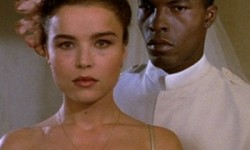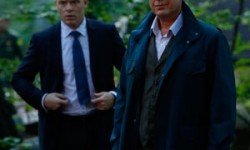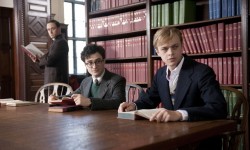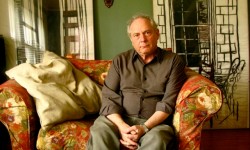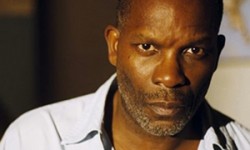
Locarno Film Festival: If I Were a Thief… I’d Steal, Roxanne, The Special Need, The Green Years, 2001: A Space Odyssey, It Should Happen to You, and Mouton
Editor’s Notes: The following article is part of our coverage of the Locarno International Film Festival. For more information on the festival visit pardolive.ch and follow the Locarno International Film Festival on Twitter at @FilmFestLocarno.
As a serious fan of Kiyoshi Kurosawa’s momentous family drama Tokyo Sonata, I came to Locarno anticipating a heavy contender in the form of his latest: Real, a strange sci-fi drama that might easily be called Eternal Sunshine of the Incepted Mind. Alas, it’s only in terms of its concept that Kurosawa’s film earns those parallels; his movie is a mess, manically melodramatic and irreverently erratic every step of the way. Serious dialogue drew riotous laughter from the Wednesday morning crowd and the last twenty minutes make jaws and the floor the best of friends. Much more to be said in my full review.
 Portuguese director Paulo Rocha’s latest film If I Were a Thief… I’d Steal makes its bittersweet world premiere at Locarno, being as it is a posthumous work. Rocha’s first, The Green Years, premiered here exactly fifty years ago, a tragically neat way to wind down a career. The new movie is a bizarre affair, interweaving the tale of a young man who opts to leave home for Brazil in the wake of his father’s death and various clips from across the spectrum of Rocha’s filmography. In a sense, it makes for a great introduction to the filmmaker’s work, yet at the same time it’s an alienating structure that seems more a self-curated retrospective than an appreciable artwork accessible to those erstwhile unfamiliar with Rocha’s films. Even so, beauty abounds in the majority of shots; there’s an incredible black and white to colour transition that perfectly attests the immense aesthetic capabilities the director evidently possessed, as well as functioning as the perfect midpoint between the movie’s disparate strands. A challenge this may be, but it’s a fixating one indeed.
Portuguese director Paulo Rocha’s latest film If I Were a Thief… I’d Steal makes its bittersweet world premiere at Locarno, being as it is a posthumous work. Rocha’s first, The Green Years, premiered here exactly fifty years ago, a tragically neat way to wind down a career. The new movie is a bizarre affair, interweaving the tale of a young man who opts to leave home for Brazil in the wake of his father’s death and various clips from across the spectrum of Rocha’s filmography. In a sense, it makes for a great introduction to the filmmaker’s work, yet at the same time it’s an alienating structure that seems more a self-curated retrospective than an appreciable artwork accessible to those erstwhile unfamiliar with Rocha’s films. Even so, beauty abounds in the majority of shots; there’s an incredible black and white to colour transition that perfectly attests the immense aesthetic capabilities the director evidently possessed, as well as functioning as the perfect midpoint between the movie’s disparate strands. A challenge this may be, but it’s a fixating one indeed.
A programme of shorts from Locarno’s Filmmakers Academy initiative brought Wednesday to a close; this bunch, labelled “Dare to Be Weird”, united the more experimentally-inclined of the 25-strong selection for an evening of oddity. Equal excesses of black comedy and genitalia here, with highlights including Beatitudes, a Roy Andersson-esque Greek short from Aristotelis Maragkos, and Pawel Kluth’s delightfully titled, ingeniously enacted single shot crime caper Casino Royale with Cheese. Evidently the talent the festival seeks to foster is as diverse and distinctive as that it presents in-competition and otherwhere; don’t be surprised to see them back in Locarno some time soon.
The idea of academy alumni coming back to Locarno offers a fine segue to Thursday morning’s polemic panel “Why Film Critics Still Matter”, hosted by Indiewire’s Eric Kohn, whose Critics Academy initiative started life at last year’s festival and has since expanded to the New York Film Festival and, this coming year, to Sundance. Adam Cook, Beatrice Behn, and Giovanni Vimercati are signals of its success, each returned to the festival as working critics and panellists alongside Wiener Zeitung’s Alexandra Zawia and The Hollywood Reporter’s Neil Young. An oddly persistent question on technical knowledge of lenses was the sole distraction from an otherwise vastly informative discussion. It’s fitting that the panel has dropped the uncertainty of last year’s incarnation, “Do Film Critics Still Matter?”; Kohn and co have already managed to answer that question in spades.
 Taking its title, and more than once a musical cue, from The Police’s song of the same name, Romanian drama Roxanne sees debut director Vali Hotea connecting past and present with the story of a man who accesses his now-declassified security files and discovers he may have fathered a child way back in 1989. Pairing the chief conceit with the protagonist’s mother’s increasingly evident fall to dementia, Hotea invokes generational tiers to paint a picture of Romania in the modern day, yet struggles all the while on the primary plane of basic storytelling. His character is fundamentally uninteresting, too self-absorbed to invest in, too inactive to root for. His meandering efforts to uncover the truth are less dramatically engaging than amusingly unwise, and for it inherently incredible. Yet there’s a genuine importance to the subject at hand that Hotea’s more questionable directorial decisions can’t manage to abate; Roxanne may be an unwieldy beast of a movie, but it has more to say than its misgivings might suggest.
Taking its title, and more than once a musical cue, from The Police’s song of the same name, Romanian drama Roxanne sees debut director Vali Hotea connecting past and present with the story of a man who accesses his now-declassified security files and discovers he may have fathered a child way back in 1989. Pairing the chief conceit with the protagonist’s mother’s increasingly evident fall to dementia, Hotea invokes generational tiers to paint a picture of Romania in the modern day, yet struggles all the while on the primary plane of basic storytelling. His character is fundamentally uninteresting, too self-absorbed to invest in, too inactive to root for. His meandering efforts to uncover the truth are less dramatically engaging than amusingly unwise, and for it inherently incredible. Yet there’s a genuine importance to the subject at hand that Hotea’s more questionable directorial decisions can’t manage to abate; Roxanne may be an unwieldy beast of a movie, but it has more to say than its misgivings might suggest.
What has less to say than its successes might suggest is The Special Need, a strangely structured docudrama following the efforts of two friends to help an autistic third to lose his virginity. Nominally a documentary feature, its shooting style betrays a meticulous construction that sees the movie play far more like fiction. Yet the occasional scenes, essentially interviews, in which protagonist Enea espouses his thoughts on the road trip that constitutes the movie’s narrative see it enslaved by the particular duality of this dynamic. It’s as though director Carlo Zoratti, one of the aforementioned friends, has recognised the uneasy sense of manipulation the movie occasionally requires and tried to mask it with a façade of fiction. It leaves the film curiously stagnant, and its intentions mysterious, if extant at all. Still, Zoratti sure knows how to use a camera: if The Special Need fails on the formal falsity of its structure, it thrives on its warm aesthetic, beautifully rendering the various rural locales in which this strange adventure takes place.
 Spotting the aforesaid tragic neatness of Rocha’s career, the festival opted to screen The Green Years in tribute to the late director. Introduced by star Isabel Ruth, among others including Rocha acolyte and former student Pedro Costa, it’s immediately evident how integral the work is to Portuguese cinema. Centred on the burgeoning romance between Ruth’s city girl and a country boy who moves to Lisbon to work as a cobbler, it’s as much a love story as it is a collision of cultures that stands as a snapshot of the nation in the 1960s. Taking cues from Italian neorealism and the Nouvelle Vague, Rocha’s movie is a reckonable debut, laced with loveable characters and snappy dialogue, yet laden with a brooding darkness that looms over the lightness like black clouds on the horizon. Its finale is at once sudden and unsurprising, an inevitable end to a scenario far more fatalistic than it seems on the surface. Its contemporary discoveries will likely characterise Locarno 66 far more, but rediscovering Rocha and his tremendous first film is a feat for which the fest should be seriously feted.
Spotting the aforesaid tragic neatness of Rocha’s career, the festival opted to screen The Green Years in tribute to the late director. Introduced by star Isabel Ruth, among others including Rocha acolyte and former student Pedro Costa, it’s immediately evident how integral the work is to Portuguese cinema. Centred on the burgeoning romance between Ruth’s city girl and a country boy who moves to Lisbon to work as a cobbler, it’s as much a love story as it is a collision of cultures that stands as a snapshot of the nation in the 1960s. Taking cues from Italian neorealism and the Nouvelle Vague, Rocha’s movie is a reckonable debut, laced with loveable characters and snappy dialogue, yet laden with a brooding darkness that looms over the lightness like black clouds on the horizon. Its finale is at once sudden and unsurprising, an inevitable end to a scenario far more fatalistic than it seems on the surface. Its contemporary discoveries will likely characterise Locarno 66 far more, but rediscovering Rocha and his tremendous first film is a feat for which the fest should be seriously feted.
Friday, for reasons both varied and valid, passed by without a single film seen, a criminal (in)activity whose deserved shame, I assure you, was severely felt. It ought to have involved Change of Life, Rocha’s second feature and—after seeing The Green Years—one of the festival’s most anticipated titles, but a subtitling issue saw to it that I fled the screening and its decontextualised—but beautifully restored—images. The same problem didn’t seem to bother Abel Ferrara, who arrived at his masterclass fresh from Rocha’s movie touting its merits in a typically candid question and answer session that touched on everything from his upcoming films about Dominique Strauss-Kahn and Pier Paolo Pasolini to the venomous vapidity of LA life. This is a man every bit as visceral and vehement as his movies, and just as much a joy to watch too.
Locarno is a festival that pushes discovery above almost all else, taking chances on new visions and voices. That doesn’t preclude paying tribute to those of the past, though, and Douglas Trumbull’s award was celebrated Saturday morning with a screening of 2001: A Space Odyssey. That sense of discovery may be the thing I’ve loved most about this place, but I can’t pretend this one wasn’t my most anticipated. It lived up to the expectation, of course. To experience those images on the big screen, so often looked at on smaller screens before, was to see them for the first time; it’s less in narrative terms than aesthetic that Kubrick’s movie can be called an epic. The deafening sound system of Locarno’s FEVI auditorium helped, making that eerily-scored, black-screened prologue alone one of the festival’s most spine-tingling immersive experiences. The room’s 3,599 other seats soon ceased to be, and it was but me and the movie, unblinking eyes absorbed in the stunning glow of one of the greatest films ever made. This was a culmination of a decade’s waiting, the ten years since I first watched 2001 little more than a lead-in to this moment—or at least that’s how it felt for those 148 glorious minutes.
 Back even further in film history next, with me finally making amends for managing to consistently miss out on the comprehensive George Cukor retrospective running at the festival with 1954’s It Should Happen to You. Notable as the first film role for a fresh-faced Jack Lemmon, as well as its prescient take on the cult of senseless celebrity, it’s a terrifically funny movie centred on Judy Holliday’s glorious performance as a woman who slathers her name across billboards so she can be “somebody”. She and Lemmon are a perfect comic coupling, ably flitting from adoring glances to argumentative grandstanding and back again within the same scene. Regular Cukor collaborator Garson Kanin’s script gives them plenty to play with, as does Peter Lawford’s comically clingy role as the third vertex to make up the inevitable love triangle. The last film screened before the closing ceremony and ensuing festivities, It Should Happen to You served to aptly represent both the gaiety of the Locarno experience and—by way of Cukor and his dozens of missed movies—the regret of those films that couldn’t be caught.
Back even further in film history next, with me finally making amends for managing to consistently miss out on the comprehensive George Cukor retrospective running at the festival with 1954’s It Should Happen to You. Notable as the first film role for a fresh-faced Jack Lemmon, as well as its prescient take on the cult of senseless celebrity, it’s a terrifically funny movie centred on Judy Holliday’s glorious performance as a woman who slathers her name across billboards so she can be “somebody”. She and Lemmon are a perfect comic coupling, ably flitting from adoring glances to argumentative grandstanding and back again within the same scene. Regular Cukor collaborator Garson Kanin’s script gives them plenty to play with, as does Peter Lawford’s comically clingy role as the third vertex to make up the inevitable love triangle. The last film screened before the closing ceremony and ensuing festivities, It Should Happen to You served to aptly represent both the gaiety of the Locarno experience and—by way of Cukor and his dozens of missed movies—the regret of those films that couldn’t be caught.
But stragglers rejoice! The festival may have come to a close, but those still in town were given the chance to catch up on the award winners in a series of repeat screenings. I had the pre-travel time to squeeze in Mouton, given the Special Jury Award (i.e. second place prize) in the Cineaste del Presente competition for first-time filmmakers. Gilles Deroo and Marianne Pistone’s movie certainly deserves commendation for its direction, which quietly evokes the spirit of the small French community in which its story unfolds, but the film as a whole feels uneven, an unsuccessful invocation of the randomness and repercussions of life’s little events. Exploring the titular character’s life in the lead-up to a bizarre act, and that of those he leaves behind in its wake, it’s a beguilingly broad narrative canvas on which Deroo and Pistone work, and one that never seems to congeal to anything conclusive. That’s precisely the point, in a sense, yet that doesn’t prevent the film from feeling eventually inconsequential.
Given that Albert Serra, whose Story of My Death was my least-liked of the competition entries I saw, took home the Golden Leopard, perhaps it’s no great surprise that I should fail to see in Mouton what the jury evidently did. But such diversity is refreshing, and appropriately indicative of the overall experience of Locarno 66: no taste goes uncatered, no trend untapped. It’s hard to believe it was almost two weeks ago that Baltasar Kormákur roared to 8,000 rapidly-emptying seats that “this is true cinema!” Truly, it has been.
Related Posts
Ronan Doyle
Latest posts by Ronan Doyle (see all)
- Review: The Wicker Man: The Final Cut (2013) - October 14, 2013
- This Week on Demand: 13/10/2013 - October 13, 2013
- Review: The Monkey’s Paw (2013) - October 12, 2013
-
Kyle Burton














